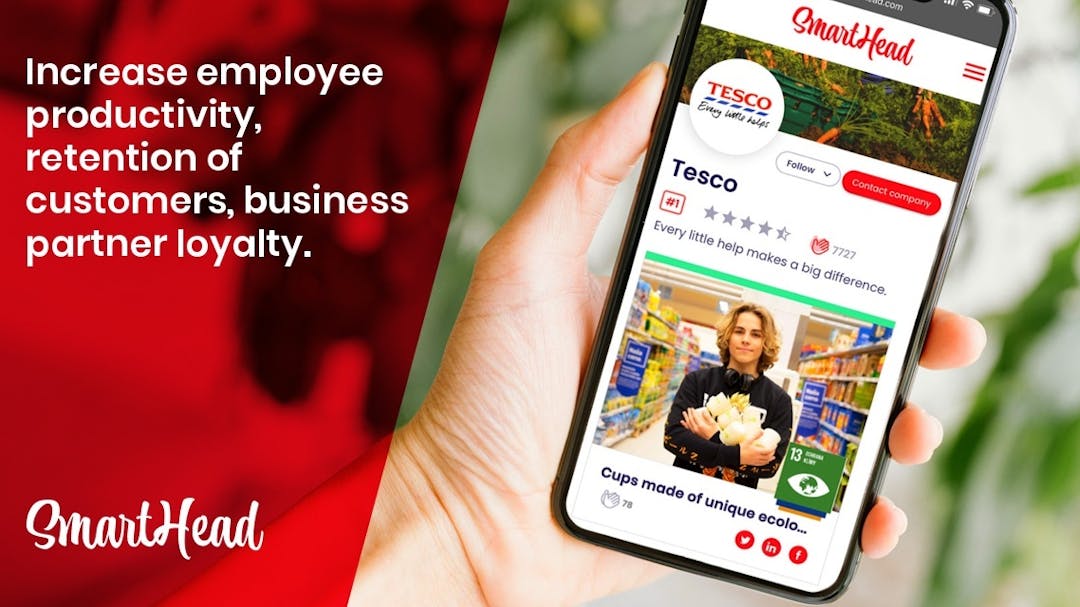Social responsibility as a path to easier recruitment and higher profits: Slovak firm SmartHead helps companies take advantage
02/09/2021
Whereas a few decades ago the word “ecology” was a cause for laughter and people with disabilities were confined to special schools, today no one is surprised if you bring your own cup to a café and the coffee is made by a barista with Down’s syndrome. We have made great progress as a society, but we are not done yet. Social responsibility and sustainability have become increasingly important to more and more people, as well as a way for companies to maintain their competitiveness, recruit new talent and, primarily, to make the world a better place for us and future generations. The Slovak firm SmartHead is responding to the challenges and opportunities this creates for companies.
For some a part of their DNA, for others an obligation
Corporate Social Responsibility (CSR) is increasingly moving from the periphery of interest into the boardrooms of companies across countries and sectors. For some companies, sustainability is a part of their DNA, while others are only beginning to address it based on the demands of customers or legislation. With measures such as the EU’s Green Deal for Europe and the UN’s Sustainable Development Goals (SDGs), greater emphasis on sustainability from state institutions can be expected. However, employees and potential employees are increasingly paying attention to how companies treat the environment, their employees and their surroundings. Sustainability also affects companies’ profits.
Companies that don’t reduce CO2 emissions risk 5–50% lower profits
According to the consulting firm Roland Berger, sustainability is the key to maintaining competitiveness. In its study, “The new competitiveness paradigm: Decarbonization as an opportunity for companies”, the firm states that companies in certain sectors could see their profits fall by up to 50% if they do not reduce their CO2 emissions. However, profit in connection with sustainability is also influenced by customers and employees.
Sustainable development is not only about the climate, as it also involves gender equality, decent working conditions, innovation and justice.
CSR as a purchasing criterion
Whether we’re talking about B2B or B2C, customers care about how their suppliers approach sustainability. In the automotive industry, that directly involves the carmakers. These manufacturers demand sustainability from their supply chain and check whether suppliers actually are in compliance with the SDGs or similar plans. In B2C, this involves all of us, as we influence corporate social responsibility. According to a survey conducted by Ipsos, 65% of Czechs will pay more for socially responsible products and 53% of the population declares that CSR plays a role in their purchasing decisions.
Credit for this goes primarily to members of Generation Z – though not entirely, as a look back to 1989 and the causes of the Velvet Revolution in the smog-choked Ústí region shows. But sustainable development is not only about the climate, as it also involves gender equality, decent working conditions, innovation and justice. And these are precisely the issues that the youngest generation is not afraid to talk about. As they enter the labour market, they will influence the behaviour of companies. Today’s employees care as much about the social responsibility of their employers as they do about the work they perform.
CSR as a criterion for employment decisions
Gen Z and Millennials still care about their wages and benefits, but their idea of how they work is different. Flexible working hours, home-office and, for example, employee health (availability of fruit and vegetables, sports allowance, etc.) are becoming the norm. They also care about the equality of conditions in the workplace and their company’s CSR in general. Concepts such as diversity and inclusion are not foreign to people born after 1995 and companies have to respond to that. At least if they want to attract these talented young people.
How to navigate sustainability
It is obvious that navigating all of the opportunities (and challenges!) that sustainability offers can be complicated for companies. Smaller companies often do not know where to begin, while larger companies lose sight of what CSR activities their subsidiaries are conducting. Therefore, there is a growing necessity across sectors to communicate to customers and employees the brand’s approach to sustainability. The Slovak startup SmartHead addresses these issues through its platform.

Through an online profile on its besmarthead.com digital platform, SmartHead enables companies to record their activities based on uniform criteria and compare their activities with others in the sector.
They thus obtain both an effective data management tool and a tool for internal and external communication. At the same time, they can find inspiration and collaborate with other companies.
Thanks to SmartHead, the public gets a unified overview of their favourite brands’ CSR and the possibility to interact with them. SmartHead was established in 2016 by a team of sustainability enthusiasts. They are now seeking more fans of CSR and sustainability from the ranks of investors who can help them kick-start the company’s further growth and scale the platform by expanding to new markets. Are you one of them? Have a look at the details of the SmartHead investment opportunity and become a co-owner of the company.
RESOURCES
- https://www.audi.com/en/company/sustainability/core-topics/value-creation-and-production/supply-chain-responsibility.html
- https://www.rolandberger.com/en/Insights/Publications/Sustainability-here-to-stay.html
- https://www.rolandberger.com/en/Insights/Publications/Sustainability-in-a-business-context-Insights-from-one-of-the-leading-climate.html
- https://www.rolandberger.com/en/Insights/Publications/Sustainarama-How-sustainability-will-change-the-world-in-2050.html#!#radar
- https://www.rolandberger.com/en/Insights/Publications/Sustainarama-How-sustainability-will-change-the-world-in-2050.html
- https://www.rolandberger.com/en/Insights/Publications/Sustainability-Award-in-Automotive-2021.html
- https://www.pwc.de/en/sustainability/sustainability-in-the-automotive-industry.html
- https://www.capgemini.com/research/sustainability-in-automotive/
- https://www.ipsos.com/cs-cz/bez-spolecenske-odpovednosti-se-kvalitni-firemni-strategie-neobejde
- https://www.spolecenskaodpovednost.cz/nova-studie-fairtrade-foundation-nerovnosti-mezi-muzi-a-zenami-v-komunitach-globalniho-jihu/
- https://faktaoklimatu.cz/infografiky/emise-cr-detail
- https://faktaoklimatu.cz/infografiky/emise-eu-poradi
- https://www.czechcrunch.cz/2021/06/zadny-rok-2030-nebo-2050-klimaticke-zmeny-jsou-tady-ted-a-tykaji-se-vsech-upozornuji-recnici-tedx-narodni/
- https://www.pabeni.cz/green-sprint
- https://www.nadaciapontis.sk/novinky/reportovanie-o-udrzatelnosti-sa-bude-po-novom-tykat-vsetkych-velkych-firiem-reforma-vsak-slubuje-menej-byrokracie/
- https://rolandberger-com.mynewsdesk.com/pressreleases/the-green-economy-how-sustainable-business-management-becomes-a-competitive-advantage-3091726
- https://www.zenefits.com/workest/what-does-gen-z-want-from-a-job-hint-its-not/
- https://www.mckinsey.com/industries/consumer-packaged-goods/our-insights/true-gen-generation-z-and-its-implications-for-companies
- https://www.agilitypr.com/pr-news/public-relations/gen-z-gaining-huge-market-share-is-your-brand-engaging-them/
- https://www.zenefits.com/workest/corporate-social-responsibility-and-the-rise-of-the-gen-z-worker/